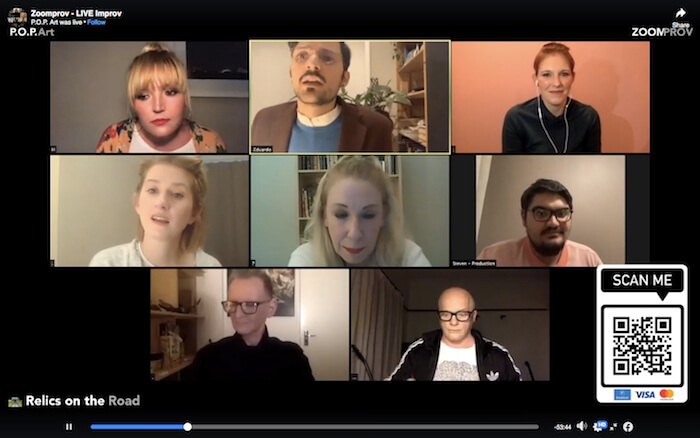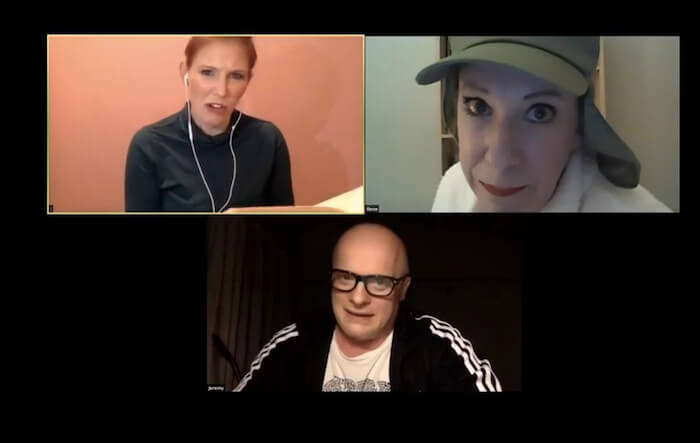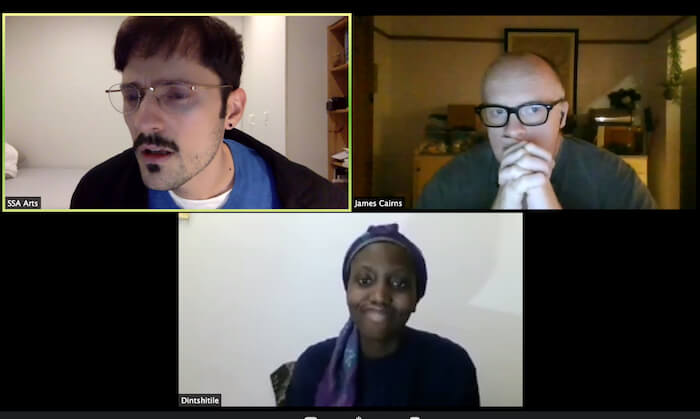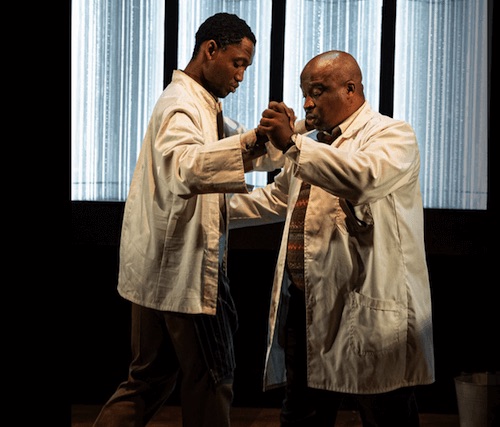 It’s going to be a long time before anyone will want to sit in the dark surrounded by a bunch of strangers, says Hayleigh Evans, founder of the POPArt theatre.
It’s going to be a long time before anyone will want to sit in the dark surrounded by a bunch of strangers, says Hayleigh Evans, founder of the POPArt theatre.
The once-lively little venue in Maboneng, Johannesburg, is dark now, closed for the Covid-19 lockdown that won’t allow people to frequent the theatre again until even level one is lifted. That’s still in the unforeseeable future, although Evans reckons many people won’t return at all until a vaccine is found.
To survive and keep itself and its actors top of mind, POPArt has tweaked the experimental nature it was founded on and gone online. I tuned in for the second of its Improv Online sessions, where six comedic actors including James Cairns and Toni Morkel performed a series of sketches and games via Zoom. Almost as in real life, the audience could suggest topics for the skits, and heckle if they felt the urge.
It wasn’t perfect, obviously. The actors must stay within sight of their laptop cameras, so mad flamboyance is replaced with a mere stilted bobbing. Worse, though, is the lack of camaraderie that builds up in a theatre as our laughter feeds off itself. Then my link died completely when my router took a nap. Still, there was a magical air that comes from the human interaction we’re all craving to break the isolation.
 The first time the improv went online was a real experiment, as they battled with software to link the Zoom video to a Facebook feed to expand the viewing capacity beyond Zoom’s audience limit of 100. Now the backstage team is growing adept at solving technology challenges, and Evans talks about the possibilities with excitement in her voice. “I’m like a mad professor coming up with loads of ideas,” she says.
The first time the improv went online was a real experiment, as they battled with software to link the Zoom video to a Facebook feed to expand the viewing capacity beyond Zoom’s audience limit of 100. Now the backstage team is growing adept at solving technology challenges, and Evans talks about the possibilities with excitement in her voice. “I’m like a mad professor coming up with loads of ideas,” she says.
“The most important thing for POPArt is that this experimental space has to continue. What we’re doing now is experimental as we’re trying to figure out the best way that live performances can translate into the virtual space without doing long-term brand damage that makes it look horrendous, because ultimately we want people to come back to the physical space. We’re not going to be able to have an audience in a room for a long time, so live performers have to find other ways to work. We have to be thinking long term - which is difficult when the wolves are at the door.”
POPArt is better positioned for survival than most theatres because it’s small with few fixed overheads. It was also winding down its Maboneng studio and searching for new premises, so the mindset was already geared for change.
 Actors everywhere are now starring in their own tragedies, with their income instantly curtailed and no success stories so far about government support. The Theatre Benevolent Fund is even distributing food packages, but only to actors, not the technical crews.
Actors everywhere are now starring in their own tragedies, with their income instantly curtailed and no success stories so far about government support. The Theatre Benevolent Fund is even distributing food packages, but only to actors, not the technical crews.
Yet some still haven’t accepted the need to morph into online performances, Evans says. “I’m sensing a polarisation. A lot of people are live practitioners and that’s how they identify, but the important realisation is that we have to adapt. You have to participate for survival and the most important thing for POPArt is that we continue to provide a platform.”
Evans herself sounds remarkably upbeat about the future. “I don’t have time to be depressed,” she laughs. “I did some corporate work last year about adaptability and my personality type is absolutely a cheerleader anyway. I’m saying right, this is how we’re going to do it, let’s go. Luckily we have people in our team who are a little more meditative. But we’re an independent theatre – we know how to survive on nothing. That’s been our model for 10 years!”
The idea of broadcasting live improv came when the locked-down players held their usual weekly rehearsal via Zoom. “We said wow, this could work if we opened it up to an audience,” Evans says. Two things have been hugely encouraging. Firstly, viewers can make donations, and the income has been higher than it would be for a full house of physical tickets. That’s a novelty for POPArt, which sometimes battled to persuade people to physically attend a show in downtown Johannesburg at night. People who can’t afford to pay can also watch without fear of judgement.
Secondly, the show reached several different countries. “We had an audience from all over the world and that’s so cool because the audience online is vast - you can do the same thing every day and more people can join in without exhausting the market,” Evans says.
Other theatres are keeping the arts alive by screening pre-recorded plays and asking for donations. The UK’s National Theatre records world-class productions for NTLive cinema screenings, and it’s broadcasting a play every week for free, with a typically British understated request for donations.
 Cape Town’s Fugard Theatre screened a pre-recorded production of Master Harold and the Boys for free on YouTube. Now it’s building audience support by requiring people to join the Friends of the Fugard programme if they want to watch the screening.
Cape Town’s Fugard Theatre screened a pre-recorded production of Master Harold and the Boys for free on YouTube. Now it’s building audience support by requiring people to join the Friends of the Fugard programme if they want to watch the screening.
Unfortunately, few theatres have a catalogue of filmed productions to fall back on, because filming live shows well requires a massive budget, and, more honestly, nobody ever expected theatres to go dark.
Masterclasses on directing, writing and performance are being staged by the New York Theatre Workshop, with viewers asked to make a donation. They sound delightful, with a session on cabaret skills called ‘How To Grab Your Audience Without Even Touching Them.’
Johannesburg’s Market Theatre has recruited artists to record a short videos at home to raise money and expand their reach. The clips available on its Facebook and Instagram accounts include actress Dorothy Ann Gould giving a monologue from Athol Fugard’s Hello and Goodbye, and a solo dance piece by Lulu Mlangeni.
Meanwhile, the National Arts Festival in June is being reconfigured as a virtual event, although details are yet to be announced and some theatricals would rather see it lie fallow than change its format.
Evans believes the lockdown will and should change how theatres operate. The digital world can attract larger audiences, and online events can exist in parallel to live performances, allowing actors to play in both. “There’s no point in going through all of this then going back to normal once theatres are able to have live performances,” she says. “There’s nothing wrong with being on Zoom on Wednesday and on stage on Thursday. I’ll probably always prefer live performances, but at least I can now challenge myself to upskill and make online content and potentially build a world-wide audience.”
For more about POPArt, see here: Fore more about the Fugard Theatre, see here: For more about the Market Theatre, see here: